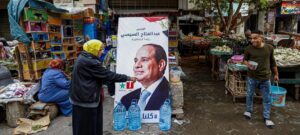
Apart from God’s blessings, I have nothing
Many Egyptians are suffering from the severe economic crisis and high inflation. President al-Sisi is under pressure, but a third term is considered certain in the latest election.
Ramadan Moh Nouah has ordered a typical Egyptian bean dish for breakfast in a restaurant on the outskirts of Cairo, and he also eats a small salad. He doesn’t have to pay for the food here. The 75-year-old couldn’t afford it anyway. To earn a few Egyptian pounds, he sells tissues on the street: “I receive a small pension, but it’s not even enough to pay my electricity bill,” he says. He and his wife live in one room. “Kind-hearted people give me small donations. Apart from God’s blessings, I have nothing.”
Moh Nouah lives from hand to mouth. Many people in the neighborhood, which is considered relatively affluent, are so poor that they can’t even afford the inexpensive Egyptian breakfast. That’s why restaurant owner Mohammed Radwan, whose real name is different, provides free meals: “We have to help those in need. If someone comes and says, ‘I need something to eat,’ you can’t say ‘no,'” he says.
Egypt’s economy is in a severe crisis. In the past year alone, the Egyptian pound has lost about half of its value. However, salaries have not been increased. The economic pressure is felt by everyone in the country – including restaurant owner Radwan. The prices for ingredients rise every day. “But I can’t increase the price of a sandwich every day. That means my profit decreases within a short period of time.”
He tries to keep the customers by doing so. “Nowadays, hardly anyone cares about profit. That means that if a large restaurant manages to cover the costs for the labor force and raw materials, it already considers itself a hero.”
35 million Egyptians only have two dollars a day
Radwan’s restaurant is popular, not only for those who eat for free here. Helping them is a duty for the restaurant manager: “Our religion tells us to donate and give alms.” A Muslim must help those in need, regardless of whether they are Muslims themselves or not. “This is not a financial loss because livelihood depends on God,” explains the entrepreneur.
This is how many Egyptians see it. They rely on God because they have hardly anything else to rely on. According to official figures, one-third of the population live below the poverty line. That means that more than 35 million people have to get by on about two dollars a day – or even less. They receive almost nothing from the Egyptian state because it is almost bankrupt.
Prestige projects instead of problem-solving
In recent years, a lot of money has been invested in President Abdel Fattah al-Sisi’s prestige projects instead of solving the country’s structural problems. One example is the new administrative capital, says Timothy Kaldas, deputy director of the Tahrir Institute for Middle East Policy: “The new administrative capital is a huge waste of money, especially considering the financial crisis in the country.” Billions of dollars are being spent on it.
Construction companies, many of which are owned by the military, are constructing university buildings and ministries, skyscrapers, and spacious villas. According to the president’s plans, millions of people are supposed to find a home here. However, most houses and apartments are empty.
Al-Sisi as a guarantee for security
Because only a fraction of the Egyptian population can afford a newly built apartment. Most Egyptians live in places where there are hardly any paved roads and certainly no lighting. For 29-year-old Nadia, this is not a problem. She appreciates one thing above all – security. “That gives me a good feeling. Here in Egypt, we have an army that defends us when the country is in danger,” she says.
For her and her husband, it is clear: despite the economic problems in the country, the lack of healthcare, and inadequate education for their children, they will vote for al-Sisi in the presidential election. He does not miss an opportunity to present himself as a guarantee for security and stability in his own country and the Middle East, often in front of glittering facades.